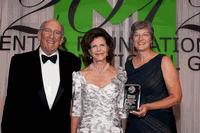AIR’s Good Behavior Game Receives International “Best Practice” Award from Queen of Sweden
Washington, D.C. – The American Institutes for Research (AIR) has received the Mentor Foundation’s “International Best Practice Award” for its work on the Good Behavior Game (GBG). This classroom behavior- management strategy for elementary school children boosts their success in school and improves their behavioral, social-functioning, and mental health outcomes. Queen Silvia of Sweden, founder of the Mentor Foundation, presented the award on Sept. 20 at the Foundation’s International Gala in Washington, D.C.
 “GBG provides teachers a tool to help socialize children into the role of student. The Mentor Foundation recognizes that early prevention works. GBG has a positive impact on a broad reach of outcomes that support children’s success in the classroom and into adulthood,” said Jeanne Poduska, who leads AIR’s GBG work. Poduska and Dr. Sheppard Kellam, professor emeritus at Johns Hopkins Bloomberg School of Public Health and former GBG researcher at AIR, accepted the award on behalf of AIR. The award recognizes GBG as an example of evaluated best practice for preventing substance abuse.
“GBG provides teachers a tool to help socialize children into the role of student. The Mentor Foundation recognizes that early prevention works. GBG has a positive impact on a broad reach of outcomes that support children’s success in the classroom and into adulthood,” said Jeanne Poduska, who leads AIR’s GBG work. Poduska and Dr. Sheppard Kellam, professor emeritus at Johns Hopkins Bloomberg School of Public Health and former GBG researcher at AIR, accepted the award on behalf of AIR. The award recognizes GBG as an example of evaluated best practice for preventing substance abuse.
Peer-reviewed research shows that GBG reduced aggressive, disruptive behavior and increased on-task behavior of participating students as early as first grade and into middle school, compared to peers who did not take part. At young adulthood, GBG’s positive influence continued: rates of alcohol abuse/dependence, drug abuse/dependence, smoking, violent behavior, and suicide ideation and attempts, for instance, were all lower. Males who exhibit aggressive, disruptive behavior when entering first grade benefited most from GBG.
In GBG classrooms, teachers assign students to teams, balanced for gender and behavior. Teams are rewarded if members do not break the classroom rules more than four times during the game. Players get immediate rewards, but as the game evolves they have to wait longer. All teams have the opportunity to win. The players work together to create a positive learning environment by monitoring their own behavior and that of their classmates.
AIR works with school districts and communities on all aspects of GBG implementation – planning, training teachers and local coaches, and monitoring practices over time.
For more on the Good Behavior Game, go to www.air.org/gbg.
About the Mentor Foundation
The Mentor Foundation was founded in 1994 by Queen Silvia of Sweden in collaboration with the World Health Organization (WHO) as an independent, non-governmental, not for profit, working in the field of drug abuse prevention at a global level. Mentor is committed to providing and encouraging the development of best practices and effective policies in drug abuse prevention and the promotion of health and well-being for all young people. The foundation’s work has been recognized by the United Nationals Office on Drugs and Crime, the Organization of American States, the Council of Europe and WHO. Mentor operates with national chapters in the United States, Colombia, Germany, Latvia, Lithuania, Sweden, United Kingdom, and with a regional chapter serving 22 Arab countries. Since its inception Mentor has worked in 80 countries on more than 90 drug-prevention projects. Its work has reached at least six million young people and 80,000 practitioners, policymakers, parents and teachers. For more information, visit http://www.mentorfoundation.org/.
About AIR
Established in 1946, with headquarters in Washington, D.C., the American Institutes for Research (AIR) is a nonpartisan not-for-profit organization that conducts behavioral and social science research and delivers technical assistance both domestically and internationally in education, health, and workforce productivity. For more information, visit www.air.org.
###